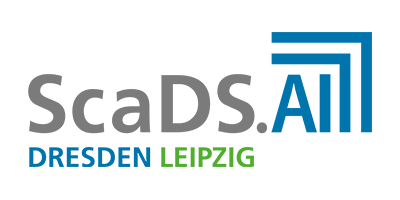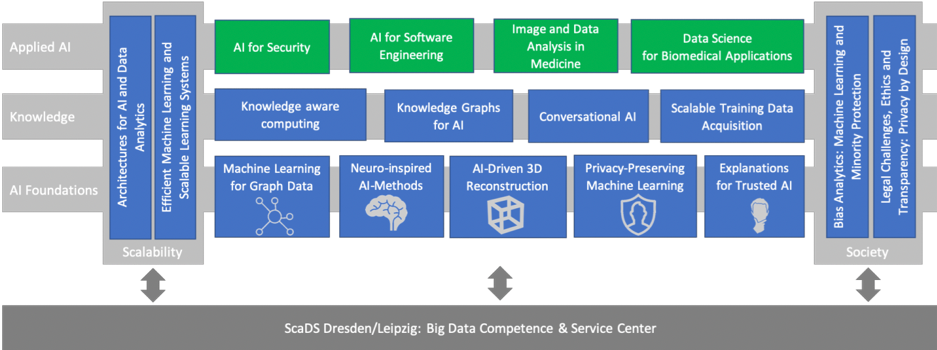AI Competence Center (2018-2022)
The national competence center for Big Data, ScaDS Dresden/Leipzig, which was founded in 2014, has been expanded to one of the German centers for Artificial Intelligence (AI). The expanded AI competence center is called ScaDS.AI (Center for Scalable Data Analytics and Artificial Intelligence) Dresden/Leipzig and is funded as part of the AI strategy of the German government. Therefore, it is supported by the Federal Ministry of Education and Research and is further strengthened by the Free State of Saxony with the establishment of several new AI professorships at both locations. In basic research on AI methods, the center aims to close the gap between the efficient use of mass data, advanced AI methods and knowledge management. In addition to new methods of machine learning and Artificial Intelligence, research topics on trust, privacy protection, transparency, minority protection and traceability of AI-driven decisions are also in the focus of attention.
The research is running at two locations, Dresden and Leipzig, by the partners:
- TUD Dresden University of Technology
- Leipzig University
- Max Planck Institute for Molecular Cell Biology and Genetics
- Leibniz Institute for Ecological Urban and Regional Development
- Helmholtz Center for Environmental Research, Leipzig
- Helmholtz Center Dresden Rossendorf.

Motivation
Artificial Intelligence (AI) aims to solve problems, identify patterns, interact with the users and be able to recognize and understand. To achieve this, AI needs access to high-quality data and formalized knowledge. By combining research on knowledge acquisition, its representation and basic research on AI methods, ScaDS.AI Dresden/Leipzig will achieve significant advances in knowledge-based methods of Artificial Intelligence in the future.
In addition, AI methods must be systematically integrated into scientific analysis workflows, which can accelerate the progress of research in many other areas. Data analysis increasingly requires highly interactive and iterative, data-driven workflows that check intermediate results and adapt the analysis in a closed loop. In business and industry, AI must be involved in the development of product designs, services and business models. There is a great need for trust, transparency and traceability of AI-driven decisions and processes. Finally, the protection of the right to privacy and the informational self-determination of citizens is still a largely unresolved issue.
Goals / Structure
In order to promote AI development and its further improvement, ScaDS.AI Dresden/Leipzig conducts research on several important topics and aims to bridge the gap between the efficient use of mass data, advanced AI methods and knowledge representation. In addition to the research areas AI Basics, Knowledge Management and Applied AI, ScaDS.AI Dresden/Leipzig investigates the challenges of applying AI in four application areas: security, software engineering, hyperspectral imaging and biomedical applications.



